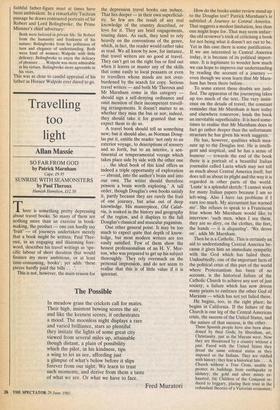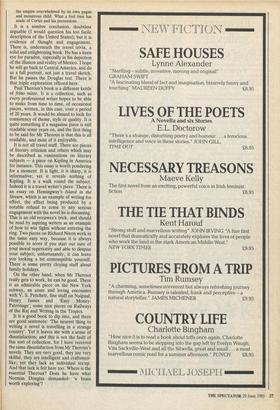Travelling too light
Allan Massie
SO FAR FROM GOD by Patrick Marnham
Cape, 0.95
SUNRISE WITH SEAMONSTERS by Paul Theroux
Hamish Hamilton, £12.50
There is something pretty depressing about travel books. So many of them are nothing more than an exercise in book- making, the product — one can hardly say 'fruit' — of journeys undertaken merely that a book might be written. Paul Ther- oux, in an engaging and disarming fore- word, describes his travel writings as 'spe- cific labour of short duration that would finance my more ambitious, or at least time-consuming, books'; yet adds 'these pieces hardly paid the bills . . .'.
This is not, however, the main reason for the depression travel books can induce. That lies deeper — in their own superficial- ity. So few are the result of any real knowledge of the country described, or love for it. They are brief engagements, touring dates. As such, they tend to rely heavily on the conventions of the genre, which, in fact, the reader would rather take as read. We all know by now, for instance, that travel writers are no good at travel. They can't get on the right bus or find out when it leaves or master any of the skills that come easily to local peasants or even to travellers whose minds are not over- burdened by the search for copy. Serious travel writers — and both Mr Theroux and Mr Marnham come in this category — should sign a self-denying ordinance and omit mention of their incompetent travell- ing arrangements. It doesn't matter to us whether they miss the bus or not; indeed, they should take it for granted that we expect them to do so.
A travel book should tell us something new; but it should also, as Norman Doug- las put it, entitle the reader 'not only to an exterior voyage, to descriptions of scenery and so forth, but to an interior, a sen- timental or temperamental voyage which takes place side by side with the other one . . . the ideal book of this kind offers us indeed a triple opportunity of exploration — abroad, into the author's brain and into our own. The writer should therefore possess a brain worth exploring.' A tall order, though Douglas's own books satisfy it, partly because they are rarely the fruit of one journey, but arise out of deep knowledge. His masterpiece, Old Calab- ria, is soaked in the history and geography of the region, and it displays to the full Douglas's classical and muscular paganism.
One other general point. It may be too much to expect quite that depth of know- ledge, but most modern writers are too easily satisfied. Few of them show the honest professionalism of an H. V. Mor- ton, who was prepared to get up his subject thoroughly. They rely overmuch on the personal impression, and do not seem to realise that this is of little value if it is ignorant. How do the books under review stand up to the Douglas test? Patrick Marnham's is subtitled A Journey to Central America.
That suggests a modest limitation, less than one might hope for. That may seem unfair: the old reviewer's trick of criticising a book for not being what it doesn't set out to be. Yet in this case there is some justification. If we are interested in Central America today, it is because of its political import- ance. It is legitimate to wonder how much we can hope to improve our understanding by reading the account of a journey — even though we soon learn that Mr Marn- ham has been there before.
To some extent these doubts are justi- fied. The apparatus of the journeying takes up too much of the text. The very insist- ence on the details of travel, the constant reminder that Mr Marnham is here today and elsewhere tomorrow, lends the book an inevitable superficiality. It is hard some- times to realise that Mr Marnham does in fact go rather deeper than the unfortunate structure he has given his work suggests.
He has, however, qualities which mea- sure up to the Douglas test. He is intelli- gent and sceptical, and he has a sense of humour — towards the end of the book there is a portrait of a beautiful Italian journalist called Lucia which may not tell us much about Central America itself, but does tell us about its plight and the way it is regarded in other parts of the world. 'Lucia' is a splendid sketch: 'I cannot work for many Italian papers because I am so left-wing. Also I have tax problems if I earn too much. My accountant has warned me'. She refuses to speak to a Franciscan friar whom Mr Marnham would like to interview: 'such men, when I see them, they are so dirty, on the clothes, the feet, the hands — it is disgusting'. 'We drove on', adds Mr Marnham.
Then he is a Catholic. This is certainly an aid to understanding Central America be. cause it gives him an immediate sympathy with the God which has failed there. Undoubtedly, one of the important facts of the political crisis of this part of the world where Protestantism has been of no account, is the historical failure of the Catholic Church to achieve any sort of just society; a failure which has now driven many priests to embrace the other God of Marxism — which has not yet failed there.
He begins, too, in the right place; he begins in California. If the failure of the Church is one leg of the Central American crisis, the success of the United States, and the nature of that success, is the other.
These Spanish people have also been aban- doned by their Gods; by liberalism, art, Christianity, just as the Mayans were. Now they are threatened by a country without a past. Faced with the United States they dread the same colonial status as they imposed on the Indians. They are riddled with history; they fear a historical fate . . . A Church without a True Cross, unable to protect its buildings from earthquake or idolatry; the gold and silver mines ex- hausted; the Children of the Conquest re- duced to beggary, placing their trust in the redundant theories of a Victorian economist; the empire overwhelmed by its own pagan and monstrous child. What a fool time has made Of Cortes and his pretensions . .
It is a sombre conclusion, doubtless arguable (I would question his too facile description of the United States); but it is evidence of thought and engagement.
There is, underneath the travel trivia, a solid and enlightening book. He has a keen eye for paradox, especially in his depiction of the illusion and reality of Mexico. I hope he will go back to Central America, and do us a full portrait, not just a travel sketch. But he passes the Douglas test. There is that triple exploration offered here.
Paul Theroux's book is a different kettle of fritto misto. It is a collection, such as every professional writer hopes to be able to make from time to time, of occasional pieces, written, in this case, over a period of 20 years. It would be absurd to look for consistency of theme, style or quality. It is quite something if a magazine piece is still readable some years on, and the first thing to be said for Mr Theroux is that this is all readable, and most of it enjoyable.
It is not all travel stuff. There are pieces of literary criticism and others which may be described as ruminations on literary subjects — a piece on Kipling in America for instance. This essay is worth pondering for a moment. It is light, it is sharp, it is informative; yet it reveals nothing of Kipling. It is a walk round the subject.
Indeed it is a travel writer's piece. There is an essay on Hemingway's Island in the Stream, which is an example of writing for effect, the effect being produced by a notable refusal to come to any serious engagement with the novel he is discussing.
This is an old reviewer's trick, and should be read by aspiring writers as an example of how to win fights without entering the ring. Two pieces on Richard Nixon work in the same easy way, because it is always possible to score if you start out sure of your moral superiority and able to despise your subject; unfortunately, it can leave you looking a bit contemptible yourself. There is some pretty cloying stuff about family holidays.
On the other hand, when Mr Theroux really gets to work, he can be good. There is an admirable piece on the New York subway, an acute and loving encounter with V. S. Pritchett, fine stuff on Naipaul, Henry James and 'Easy Money- Patronage'; some nice pieces on Railways of the Raj and Writing in the Tropics.
It is a good book to dip into, and there are good sentences: 'The nearest thing to writing a novel is travelling in a strange country'. Yet it leaves me with a sense of dissatisfaction; and this is not the fault of this sort of collection, for I have received the same dissatisfaction from Mr Theroux's novels. They are very good, they are very skilful, they are intelligent and craftsman- like; yet they lack an individual stamp. And that lack is felt here too. Where is the essential Theroux? Does he have what Norman Douglas demanded: 'a brain worth exploring'?



























































 Previous page
Previous page